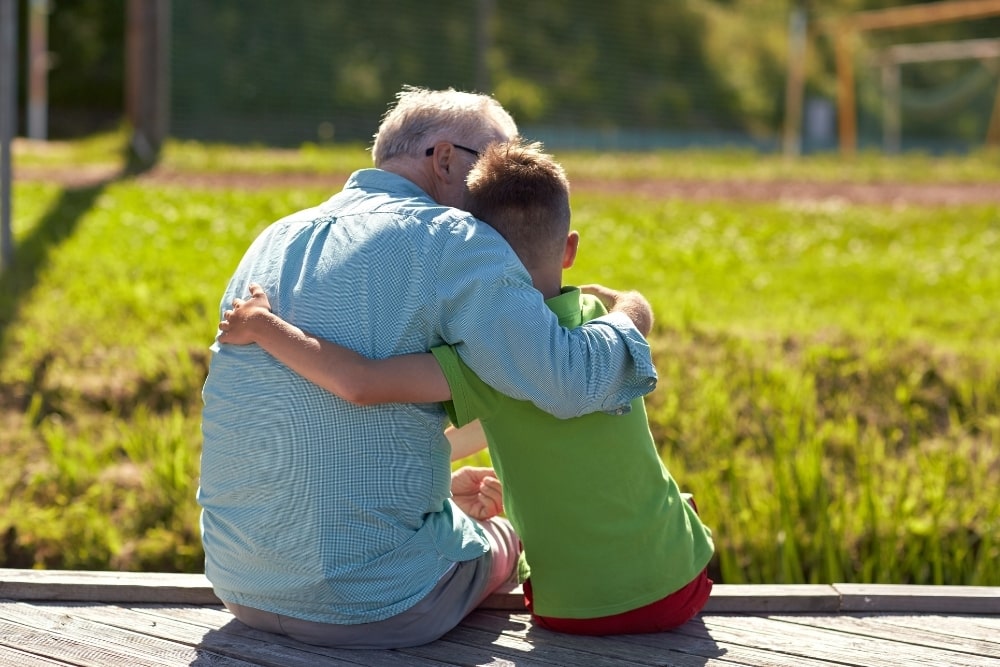There are always great questions to ask your grandparents. I was very blessed growing up. I grew up with four previous generations of my family. My great grandparents and grandparents contributed a great deal to my upbringing.
As I learned more about them, and their lives, I learned a great deal about history, life lessons, and my family. I also learned some pretty cool facts. If you want to learn more from your grandparents, consider asking them these questions.
How To Ask Your Grandparents Questions
If you don’t have a close relationship with your grandparents, it can be a bit awkward to suddenly interview them. Interview questions for grandparents can seem cliche and make the experience a bit weirder.
Those of you that aren’t conducting an interview might still not know where to start. That’s okay. These tips will make it easy for you to ask questions that will help you learn more about your family, history, and grandparents.
Relax
Take a few deep breaths if you feel anxious. Even though you feel awkward in the beginning, you’ll quickly discover that your grandparents are full of interesting information.
When you tell your grandparents that you want to learn more about them, your family, or history, they will more than likely smile and welcome whatever questions you have.
Most of the elderly are conversation deprived, so this will be enjoyable for them as well. This is a great opportunity for you and your grandparents to get to know each other.
Ask Open-Ended Questions
When we ask questions that have a yes or no answer, it can lead to a dead-end conversation. For example, if you ask “were you alive during the Great Depression?” it leaves room for your grandparents to simply say yes or no.
Then, the conversation goes on to your next question. This is not a great learning experience. Instead, ask questions such as “what was life like during the Great Depression?” This doesn’t have a yes or no answer.
It opens the conversation for storytelling and more insightful answers. Stories about what life was like or what your family is like can help you learn a great deal.
Consider Using A Tape Recorder
Prices pulled from the Amazon Product Advertising API on:
Product prices and availability are accurate as of the date/time indicated and are subject to change. Any price and availability information displayed on [relevant Amazon Site(s), as applicable] at the time of purchase will apply to the purchase of this product.
When you interview someone, you can lose a lot of the meaning behind stories if you’re concerned with writing down their answers. Instead, record the conversation.
(Make sure that you ask permission before doing this.) If this interview is for a school assignment, you can listen to the conversation and take notes after the interview.
As a bonus, this will give you more quality time with your grandparents.
Don’t Just Focus On The Assignment
It’s common for people to have to interview others for school assignments. When I was in college, one of my assignments for a cultural diversity class was to interview someone with a different background than me, for example.
There were a series of questions that I was supposed to ask. I did ask those questions, but I asked so many more about their thoughts, opinions, and perspective.
It was interesting to hear about the discovery of America from someone with an Indian background.
As you ask your grandparents questions, learn more about how they feel. What was their perspective on world events? Did they enjoy the way things were back in the day? Answers to those questions can be fascinating.
Avoid Judgement
Some questions that you ask are bound to bring up topics that people consider controversial today. Even traditional parenting methods are now considered abuse.
If your grandparents are willing to open up to you about the different things that they did, or that their parents did, try to avoid unintentionally shaming them or expressing anguish regarding their decisions.
Remember, we all do what we think is right for ourselves, and our family, at the time.
Before we were required to use infant car seats, it was considered safe to put a child in a portable bassinet (similar to a small co-sleeper not) and go on long road trips.
No one batted an eye at this behavior because it wasn’t thought to be dangerous. Today, we use gentle parenting, which has more positive effects. However, we don’t know what the studies will say regarding gentle parenting in another fifty years.
Questions To Ask Your Grandparents
View in gallery
There are quite a few different questions you can ask your grandparents, so I’ve broken them down into categories.
This can help you determine what questions to ask regarding what you’re interested in. For example, if you know a great deal about your family history, you can just skip that section.
Questions To Ask Your Grandparents About History
When you have someone that has lived through history, you get a close-up perspective that history books simply cannot compare to.
If your grandparents were alive during a historical event, it can be both interesting and educational to hear their first-person view of the event. You can also learn how it impacted them.
- What was life like before the internet?
- What do you consider the best thing to be that we have now that you didn’t have?
- If you could bring back one thing from your childhood that children could have now, what would it be and why?
- What was life like during the Great Depression (or another major historical event)?
- Did you use to have a traditional marriage like people say it was?
- Were women allowed to wear pants?
- What was life like when everyone was a hippy?
- Do you remember having an outhouse?
- How much money did you make at your first job?
- What was it like watching the internet evolve?
Life Questions To Ask Your Grandparents
Grandparents are full of wonderful life advice, from budgeting and saving money to parenting advice. There are some wise lessons you can learn when you ask your grandparents questions about life.
- How important do you think college is?
- If you could give me one piece of life advice, what would it be?
- Which is more important, love or money?
- Why do you think people stayed in marriages longer back in the day compared to now?
- What’s something that you regret about your life?
- What lessons did you learn as a child that you feel we should all learn now?
- Do you think you have a better work ethic than the younger generation?
- If you could include one thing in history books based on your own personal experience, what would it be?
- What advice would you give to future generations?
- Do you have any advice for approaching love?
Questions To Ask Your Grandma
View in gallery
If both of your grandparents are still alive, this is a really fun activity. You can learn about different points of view for the same events, and how they both say each other.
You’ll also take a step back in time to learn about how people did and viewed things long before you were born.
- What first attracted you to grandpa?
- Could grandma cook when you met her?
- Were you married before you had children?
- What’s your favorite memory with grandpa?
- What were dates like when you were younger?
- How soon did he meet your parents?
- How did your parents feel about grandpa?
- When did you know you were in love with grandpa?
- How soon did the two of you get engaged?
- Did he open doors for you?
Questions To Ask Your Grandpa
Traditionally, it was common for a boy to meet a girl’s parents before taking her out on a date. There was less equality back then in most situations. For example, my mother was born in 1956. My grandma met my grandpa in 1957.
When we take a trip back into history, we learn that women were still discriminated against legally until the Civil Rights Act of 1964.
We can also learn that 1956 was one of the first years that women and men were equally enrolled in school.
When my grandmother fell pregnant at the age of 15, no one batted an eye about her dropping out of school and staying home to help take care of the other children. It was the natural course of action for that situation.
This not only impacted home life for our grandparents, but they also had a different point of view. Both men and women held onto those traditional points of view when it came to dating, and to picking a spouse.
That’s why these questions are both interesting and educational. They will more than likely result in a brief explanation of how things were back then compared to how they are today as well.
View in gallery
- What first attracted you to grandma?
- Did you propose or did she?
- How soon did you meet her parents? How did they feel about you? What types of questions did they ask you?
- What was your view on grandma before the two of you started dating?
- Did grandma know how to cook when you first met her?
- Who planned dates back then? Was it you or her?
- How do you feel about women having children before marriage?
- What qualities were you looking for in a girlfriend when you met grandma?
- Have you ever cooked grandma dinner?
- What do you think girls looked for in a partner back then?
Fun Questions To Ask Grandparents
Everything doesn’t have to be serious during a grandparent interview. Yes, this is a great opportunity to learn about the differences between now and then. You can also learn a great deal about your grandparents, how they feel, and make them laugh too.
- If you could be any person in the world, who would you be and why?
- What’s one thing that you’ve always wanted to do that you haven’t done?
- What’s the most important piece of advice that someone gave you?
- Who do you feel had the biggest impact on your life and why?
- If you could change one thing about your life, what would it be?
- Do you regret any of your past decisions?
- What do you consider the biggest life lesson that you’ve learned in life?
- If you could change anything in the world to make it like it used to be, what would it be and why?
- If you could live in any time period, when would it be?
- Do you wish that you had been able to do anything that you weren’t allowed to do when you were younger because of your gender?
Things To Ask Your Grandparents About Their Childhood
When our grandparents and great-grandparents were growing up, things were much different than they are now.
View in gallery
When my mother was growing up, she still wore a dress every day to school and did not participate in gym, just like the other girls. (Keep in mind I’m 35. If you’re younger, this might not apply to you when it comes to your parents.)
- What sports did you play when you were little?
- How did you spend your free time when you were growing up?
- What did your family do for family time as you got older?
- How did you spend time with your mom and dad when you were growing up?
- What are some main differences that you see between school today and school when you were growing up?
- How old were you when you had your first job?
- What was your favorite thing to eat for dinner growing up?
- Do you remember what car seats were like when you were little?
- What types of things did your parents do for fun when you were younger?
- Did you have a best friend growing up?
Controversial Questions To Ask Your Grandparents
Long, long ago, there were quite a few people that did not have rights. There were abortion laws. Changes in medicine over the past twenty years have been astronomical.
However, these same things often remain a source of controversy for many people.
Some older generations do not like to discuss them because they understand that times have changed, and they don’t expect others to listen to them. Others feel so strongly about their opinions they don’t want to debate things.
Finally, there are those that are embarrassed by the past. For example, if your family-owned slaves that are not something that older members of your family are proud of, so they won’t discuss it.
However, learning more about those controversial topics can help educate you about the past, and there are always lessons to be learned.
- Were you alive during segregation? What was that like?
- Do you still feel that things are biased against people of color?
- How did the passage of abortion laws affect you and make you feel?
- Were you a part of any civil rights protests?
- Do you agree with women working more outside the home or do you feel that more traditional values should still be in place?
- How do you feel about gay marriage and gay rights?
- Would you consider letting a child be adopted by a gay couple?
- What happened in your community when certain groups were granted rights? Were their protests?
- Did you celebrate Black History Month growing up?
- What was one way that inequality affected you as an individual growing up?
Some of these questions will be irrelevant depending on how old your grandparents are. Others might be a sensitive subject. Don’t press your grandma or grandpa to answer specific questions. Instead, simply move on if they are not comfortable discussing something.
Life Lesson Questions To Ask Grandparents
View in gallery
As we grow up and grow older, there are quite a few things that we learn. We learn a lot about life, love, finances, and plenty of other things.
That’s why we’re considered wiser as we grow older. Your grandparents are full of wisdom that is not only interesting but can help you as you go through life.
- Do you feel friends are important?
- Which is more important, happiness or money?
- How do you feel people should save money?
- What’s one important thing every person should do with their money?
- Do you trust banks?
- What should younger generations know about life that they don’t know now?
- If you could give every person in my generation one piece of advice that you would consider a life lesson, what would it be and why?
- What life values do you consider important?
- Do you believe that everything happens for a reason? Why or why not?
- What lessons do you think you learned as a child that children are not learning today?
Parenting Questions To Ask Your Grandparents
Prices pulled from the Amazon Product Advertising API on:
Product prices and availability are accurate as of the date/time indicated and are subject to change. Any price and availability information displayed on [relevant Amazon Site(s), as applicable] at the time of purchase will apply to the purchase of this product.
The differences in not just gender stereotypes, but in parenting in general, can be astounding. My grandmother insisted it was great for children to cry. They can’t exercise, so crying oxygenates their lungs just like exercise does in older children.
My great-grandmother insisted that I not hold my daughter unless necessary. Too much coddling and they’ll never let you put them down, and how will I get dinner cooked?
That’s why it’s great to let babies cry it out. The parenting methods go against everything modern parents are taught. Still, it’s very interesting to learn about parenting in the 1920s or even the 1950s.
- How old were you when you had your first child?
- Do you remember car seats for infants when your kids were babies? What were they like?
- What home remedies did you use for teething when your kids were babies?
- How were you encouraged to get a baby to sleep through the night?
- Did you view it as spoiling a baby to hold an infant all day?
- How did you deal with crying babies when my parents were born?
- Do you think daycares are good for children?
- What were some parenting practices that your parents did that aren’t allowed anymore?
- Do you agree that they should not be allowed, or do you think they were best for children?
- How did society view teenage mothers when you were growing up?
Family History Questions To Ask Grandparents
Family history questions are important questions to ask grandparents. Older generations in your family know more about your family history than anyone else.
You can learn a great deal about your family, your heritage and learn some family traditions that people might not practice anymore.
- Can you make a family tree with me?
- Do we have any relatives that no one talks to anymore?
- Were twins ever born in the family?
- What are some older family traditions that you miss?
- Where did older generations of our family live? (For example, I am from Ohio. However, most of my family was southern. My Great uncle lived down in the holler in Kentucky. You see those southern roots in everything from cooking to the importance of manners in my family.)
- Do you have any cousins?
- Did you spend a lot of time with your grandparents and other family members growing up? What did you learn from them?
- What careers did your parents have?
- Why did our family move here?
- Where is our family originally from?
- What’s one thing that you love that our family does?
In Conclusion
Talking with your grandparents can give you insight into another world. You can learn fascinating details about history that have been left out of textbooks.
(This also applies if you do an interview with someone that is not your grandparent that lived through those events.) You can also learn a great deal about family history, your own parents, and the differences between now and then.








